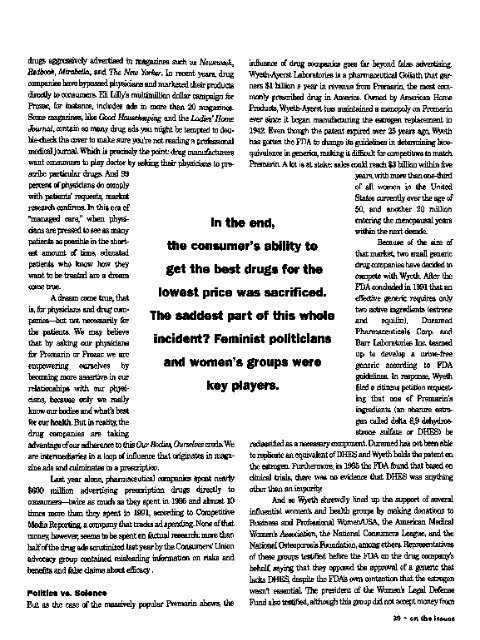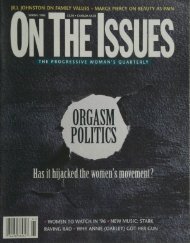women histories, incest sexual abuse. institutionalized. But what if ...
women histories, incest sexual abuse. institutionalized. But what if ...
women histories, incest sexual abuse. institutionalized. But what if ...
Create successful ePaper yourself
Turn your PDF publications into a flip-book with our unique Google optimized e-Paper software.
drugs aggressively advertised in magazines such as Newsweek,<br />
Redbook, Mirabella, and The New Yorker. In recent years, drug<br />
companies have bypassed physicians and marketed their products<br />
directly to consumers. Eli Lilly's multimillion dollar campaign for<br />
Prozac, for instance, includes ads in more than 20 magazines.<br />
Some magazines, like Good Housekeeping and the Ladies' Home<br />
Journal, contain so many drug ads you might be tempted to double-check<br />
the cover to make sure you're not reading a professional<br />
medical journal. Which is precisely the point: drug manufacturers<br />
want consumers to play doctor by asking their physicians to prescribe<br />
particular drugs. And 99<br />
percent of physicians do comply<br />
with patients' requests, market<br />
research confirms. In this era of<br />
"managed care," when physicians<br />
are pressed to see as many<br />
patients as possible in the shortest<br />
amount of time, educated<br />
patients who know how they<br />
want to be treated are a dream<br />
come true.<br />
A dream come true, that<br />
is, for physicians and drug companies—but<br />
not necessarily for<br />
the patients. We may believe<br />
that by asking our physicians<br />
for Premarin or Prozac we are<br />
empowering ourselves by<br />
becoming more assertive in our<br />
relationships with our physicians,<br />
because only we really<br />
know our bodies and whaf s best<br />
for our health. <strong>But</strong> in reality, the<br />
drug companies are taking<br />
advantage of our adherence to this Our Bodies, Ourselves credo. We<br />
are intermediaries in a loop of influence that originates in magazine<br />
ads and culminates in a prescription.<br />
Last year alone, pharmaceutical companies spent nearly<br />
$600 million advertising prescription drugs directly to<br />
consumers—twice as much as they spent in 1995 and almost 10<br />
times more than they spent in 1991, according to Competitive<br />
Media Reporting, a company that tracks ad spending. None of that<br />
money, however, seems to be spent on factual research: more than<br />
half of the drug ads scrutinized last year by the Consumers' Union<br />
advocacy group contained misleading information on risks and<br />
benefits and false claims about efficacy.<br />
Politics vs. Science<br />
<strong>But</strong> as the case of the massively popular Premarin shows, the<br />
In the end,<br />
the consumer's ability to<br />
get the best drugs for the<br />
lowest price was sacr<strong>if</strong>iced.<br />
The saddest part of this whole<br />
incident? Feminist politicians<br />
and <strong>women</strong>'s groups were<br />
key players.<br />
influence of drug companies goes far beyond false advertising.<br />
Wyeth-Ayerst Laboratories is a pharmaceutical Goliath that garners<br />
$1 billion a year in revenue from Premarin, the most commonly<br />
prescribed drug in America. Owned by American Home<br />
Products, Wyeth-Ayerst has maintained a monopoly on Premarin<br />
ever since it began manufacturing the estrogen replacement in<br />
1942. Even though the patent expired over 25 years ago, Wyeth<br />
has gotten the FDA to change its guidelines in determining bioequivalence<br />
in generics, making it d<strong>if</strong>ficult for competitors to match<br />
Premarin. A lot is at stake: sales could reach $3 billion within five<br />
years, with more than one-third<br />
of all <strong>women</strong> in the United<br />
States currently over the age of<br />
50, and another 20 million<br />
entering the menopausal years<br />
within the next decade.<br />
Because of the size of<br />
that market, two small generic<br />
drug companies have decided to<br />
compete with Wyeth. After the<br />
FDA concluded in 1991 that an<br />
effective generic requires only<br />
two active ingredients (estrone<br />
and equilin), Duramed<br />
Pharmaceuticals Corp. and<br />
Barr Laboratories Inc. teamed<br />
up to develop a urine-free<br />
generic according to FDA<br />
guidelines. In response, Wyeth<br />
filed a citizens petition requesting<br />
that one of Premarin's<br />
ingredients (an obscure estrogen<br />
called delta 8,9 dehydroestrone<br />
sulfate or DHES) be<br />
reclass<strong>if</strong>ied as a necessary component. Duramed has not been able<br />
to replicate an equivalent of DHES and Wyeth holds the patent on<br />
the estrogen. Furthermore, in 1995 the FDA found that based on<br />
clinical trials, there was no evidence that DHES was anything<br />
other than an impurity.<br />
And so Wyeth shrewdly lined up the support of several<br />
influential <strong>women</strong>'s and health groups by making donations to<br />
Business and Professional Women/USA, the American Medical<br />
Women's Association, the National Consumers League, and the<br />
National Osteoporosis Foundation, among others. Representatives<br />
of these groups test<strong>if</strong>ied before the FDA on the drug company's<br />
behalf, saying that they opposed the approval of a generic that<br />
lacks DHES, despite the FDA's own contention that the estrogen<br />
wasn't essential. The president of the Women's Legal Defense<br />
Fund also test<strong>if</strong>ied, although this group did not accept money from<br />
39 - on the issues

















